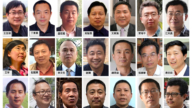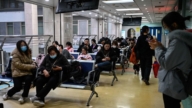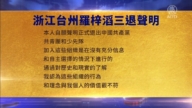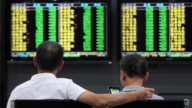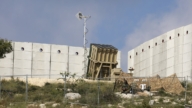【新唐人2014年05月09日讯】最近,中共和南海周边国家的摩擦不断升级,日前,菲律宾扣押中国渔船的同时,越南船只与中国船只发生冲突,导致人员受伤,到目前为止,冲突双方都没有退让的迹象。评论指出,目前中国官民矛盾,利益集团之间的矛盾,以及中共与国际社会矛盾,不断激化,互相感染。为了维护中共政权,中共只好把危机视线转移到周边国家。
5月7号,中国船只和越南海岸警卫队船只发生了碰撞,中方向越南船只发射水炮,造成越南水手受伤。据美国《华尔街日报》报导,在这之前,越南曾经试图阻止中国石油公司,在南中国海的争议海域,部署一个大型钻井平台,两国船只发生碰撞的地点,离这平台大约有10英里。
越南指称,中国钻井平台离越南海岸只有138英里,完全位于越南专属经济区范围。越南外交部长范平明,在与中共国务委员杨洁篪通话时指责,中国船只在这个地区的采油作业是非法行为,违反了国际法,侵犯了越南的主权。
中共外交部发言人华春莹,则指责越南妨碍中国的采油活动。 华春莹说,越南的行为违反了国际法和国际关系的基本准则。她还说,杨洁篪在电话中,要求越南停止干扰中国企业的正常作业。
据中国国内媒体报导,中方已经向中、越争议海域,增加80艘船只。
5月4号,中国广东海警船向越南海警船发动撞击,造成越南船只船尾右舷角落约1平方米面积的钢板塌陷,船上部分设备遭到毁坏。5月7号,中国海警船再一次向越南船发动撞击的同时,飞机也向越南海警俯冲。目前中国海警船全部撤下炮衣,准备随时开火,局势十分紧张。
时政评论员蓝述:“越南实际上在执政理念上,跟中共还有一定相近之处的这么一个国家,它现在跟它都要制造摩擦,只能说明中共已经走头无路了,国内的矛盾已经是尖锐得不得了,党内的各利益集团之间也没有办法达成协议,没有办法从国内的政策方面找到太多的出路,它不断的把中国社会关注的焦点向中国周边国家去引。”
同一天,菲律宾在南沙群岛有争议水域查扣了一艘中国渔船。船上有11名船员和大约500只海龟,其中部分海龟已经死亡。菲律宾表示,某些海龟物种受菲律宾法律保护,这艘渔船已被拖到巴拉望省,将面临指控。
而在中国国内也不平静,除了各地不断爆发的维权群体事件外,最近三个省份的火车站也发生所谓恐怖事件。
美国纽约城市大学政治学教授夏明:“对中共来说,它现在形势是非常恐慌的,因为它看到内政和外交的两方面的困难,那么再相互地交叉感染。在国内镇压的方式,影响了国际社会对中国的信心,他们的抛弃中国,就会加重中共国内的社会政治经济危机。它想用一种强硬的方式控制住危机,但是我觉得这种强硬的方式,反而可能使事情变得更糟。”
蓝述:“解决中国社会的矛盾,它需要一些替罪羊,在党内的利益斗争中,输了那就会去当替罪羊,输和赢,最关键的一个问题就是谁掌握了军队,为了掌握军队,各个方面都在讨好中共的军队里面的鹰派,从党内的各方面的矛盾尖锐到造成中共四分五裂垮台,也不是没有可能爆发与周边国家的一些局部战争。”
《华尔街日报》评论说,中国在争议海域部署大型钻井平台,引发两国海军对峙,成为这两个邻国近年来发生的最严重冲突。不过越南是一个强硬的对手,法国和美国都在这地区付出过巨大的代价。中国和越南虽然是社会主义阵营中的兄弟国家,不过越南政府不想让外界觉得它在向中国低头。而中国领导人很大程度上把政府公信力,押在了维护南中国海所谓“无可争辩的主权”上。
美国“纽约城市大学”政治学教授夏明指出,在这场最新的对峙中,中国、越南、菲律宾双方的民族主义情绪都在升温,不排除有擦枪走火的可能。
采访编辑/刘惠 后制/李智远
Escalating South China Sea Confrontation: Is It Covering up China’s Domestic Crisis?
The Chinese Communist Party (CCP)
has escalated tension with neighboring
countries around the South China Sea.
The Philippines has detained Chinese fishing boats
Conflict between Vietnamese and
Chinese vessels has resulted injuries.
No party has shown signs of compromising.
Commentators point out that the CCP is faced
with intensified conflicts both at home and abroad.
To maintain it’s regime, the CCP has to shift public
attention from domestic crises to neighboring countries.
On May 7, Chinese vessels rammed into
and fired water cannons at Vietnamese
vessels, injuring the Vietnamese sailors.
According to the Wall Street Journal, Vietnam
had previously tried to prevent the deployment
of a Chinese oil rig in disputed waters.
The vessel collision took place about 10 miles from the rig.
Vietnam says the rig is 138 miles from its shore
and entirely within its exclusive economic zone.
Vietnamese Deputy Prime Minister and Foreign
Minister Pham Binh Minh called Chinese State
Councilor Yang Jiechi to criticize drilling operations.
Minh denounced the presence of China’s drilling rig as
illegal, and in serious violation of Vietnamese sovereignty.
Chinese Foreign Ministry spokeswoman
Hua Chunying accused Vietnam of
interfering in China’s oil production activities.
Hua Chunying said Vietnam violated international
laws, and basic norms of international relations.
Hua Chunying further commented that Yang Jiechi
requested Vietnam to stop interfering in Chinese
enterprises’ normal operations over the phone.
According to Chinese media, China has
sent 80 more vessels to the disputed waters
On May 4, a Guangdong maritime police boat
collided with the Vietnam Marine Police boat.
This resulted in damage of parts of the
Vietnamese boat and it’s equipment.
On May 7, as the Chinese maritime police
ship hit the Vietnam ship, a Chinese airplane
was also present to support the action.
Currently, the Chinese maritime police boats are ready
to fire with ready guns, and the situation is very tense.
Lan Shu, political commentator: “Vietnam
has very similar political rule as the CCP.
However, it still engages in such conflict with
China, meaning the CCP is in a desperate situation.
With sharp domestic conflicts, the CCP is
faced with internal conflicts within the party.
With lack of resolution, the CCP has to divert
Chinese peoples focus to neighboring countries.”
On the same day, The Philippines detained a
Chinese fishing boat in the disputed Spratly Islands.
This included it’s 11 crew members and a cargo of
approximately 500 sea turtles, some of which had died.
The Philippines said that some turtle
species are protected under their laws.
The vessel had been dragged to
Palawan Province to face charges.
Mainland China has also faced it’s own escalating conflicts.
There have been large scale human rights groups activities.
Three provinces have also witnessed public attacks
or bombs in railway stations during the past two months.
Professor Xia Ming, Political Science,
New York City University: “The CCP felt panic
due to difficult conditions domestically and with
foreign affairs, as well as their mutual impact.
The regimes oppressive nature domestically has
reduced the trust from the international community.
Ultimately, they abandon China, and subsequently there
are increased domestic economic and political crises.
The tough measures that the CCP has
employed, I believe, is making it worse.”
Lan Shu: “They need the scapegoat to
try to resolve conflict in Chinese society.
Whoever loses in the internal
fighting will become the scapegoat.
The most critical question is who
grasps control of the military.
The sharp conflicts within the CCP are
causing it to fall apart, and also possibly
result in war with neighboring countries.”
The Wall Street Journal added
further comment to recent events.
A naval confrontation between China and Vietnam, over
China’s attempts to anchor a giant oil rig in disputed
waters, is by far the most serious episode in recent
years between the two historically entwined neighbors.
Yet, Vietnam is a tough adversary, as French and later
U.S. forces in Indo-China found out to their immense cost.
China and Vietnam are now brothers
in a dwindling socialist fraternity of nations.
The Vietnamese government cannot
be seen to be bowing to China.
And modern Chinese leaders have staked much
of their credibility in upholding their “indisputable
sovereignty" over the South China Sea.
Professor Xia Ming indicates that it
is possible to misfire in this situation.
Nationalist sentiment is escalating in
China, Vietnam and The Philippines.
Interview & Edit/Liuhui Post-Production/Lizhiyuan





